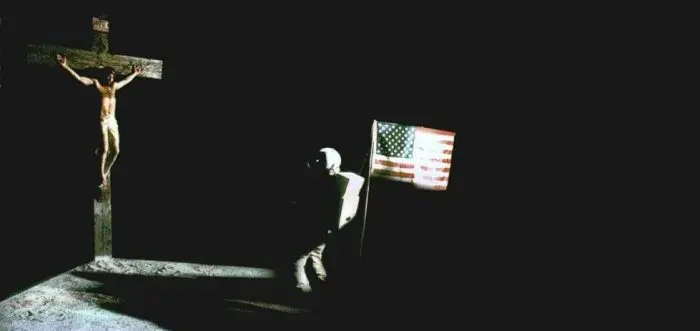
The saddest part of Christian leadership in America is its schizophrenic attitude towards war perpetrated by the state both at home and in foreign soil. It is a bizarre sight to behold when the church (of various mainline denominations), intended to be the ultimate force for peace, reconciliation, and justice, urges the United States President not to withdraw troops from Syria. Evangelical leaders such as Franklin Graham even went as far as to pray that President Trump might change his mind and postpone the withdrawal.
The justification for their stances, these evangelical leaders claim, is that the Kurdish forces who are acting in that region might get wiped out by, oddly enough, another ally of the United States—Turkey. Next to little has been discussed about the United States actual foreign policy of building close relationships with unsavory governments in the Middle East such as Saudi Arabia to whom the United States government has provided arms worth billions of dollars, and with whom the United States government has been complicit in the continuous war on Yemen, a war that has cost massive civilian lives.
Why hasn’t the evangelical church in America questioned its government’s close involvement with the governments of Saudi Arabia? Why hasn’t it questioned America’s close ties with bizarre propagandist actors in Syria such as the White Helmets, an organization known to have assisted in human rights violations, and rebel factions that have carried out unspeakable acts of murder. Why hasn’t it spoken out against the so-called war on drugs, which continues to imprison countless non-violent offenders at home?
Rather than question the abuses of statist power, the evangelical leadership of America has instead encouraged a bystander philosophy in the face of injustice. It has repeatedly demonstrated its powerlessness in bringing about lasting peace through its influence in high places. What is even more shocking is the fact that the evangelical church in America, through its support of wars in foreign soil and the war on drugs, has strangely held on to the old pagan concept of using ‘evil against evil.’ This causes the church to grow schizophrenic.
As the church is meant to be a force for mercy and reconciliation, its embrace of pagan human sacrifice, refined in modern statist violence, has caused it to grow two conflicting personalities. This, in some sense, resembles the psychological struggle of Vincent Kane, the main character in William Peter Blatty’s post-Vietnam war novel ‘The Ninth Configuration.’
At the start of Blatty’s movie, Vicent Kane is introduced to us as a military psychiatrist who is tasked with curing a group of servicemen who are either feigning madness or really are crazy. Vincent empathizes with these crazed patients and is willing to listen to their many ramblings. He develops a special bond with an astronaut named Billy Cutshaw. With Cutshaw, Vincent often discusses the age-old problem of theodicy, and later on, Cutshaw hints to Vincent that the inmates of the asylum might be feigning madness so that they won’t go completely crazy by being in ‘service to their country.’
Vincent Kane’s openness towards the patients and Cutshaw, in particular, implies that he is a good man who, despite his awareness of a strange and lurking evil, wants to heal and save people. In the company of ‘God’s fools,’ all the good in Vincent Kane is brought out. But an accidental confrontation with a fellow Vietnam veteran makes him realize that he was, during the war, a psychotic murderer who came to be known as ‘Killer Kane.’ Vincent’s countless days spent in combat had turned him into a murderous individual who committed an unspeakably horrendous act, and later on, he developed an alternate personality, that of a caring healer, to shut out the murderer that he had become.
In light of this reality, it is made known that an ‘act of saving grace’ might be Vincent’s only chance of curing himself of this terrible duality from which he suffers, this schizophrenia which is threatening to kill him, and, indeed, it does so in the end.
This ‘act of saving grace’ turns out to be self-sacrifice from Kane. Cutshaw is driven to despair upon realizing that Kane is a murderer, but Kane is able to redeem him and the other patients by giving up his own life as a ‘shock treatment’; through killing himself Kane cures the inmates of the asylum. Thus, through tragedy comes hope, a truly bittersweet revelation that humanity as a whole must heed.
The evangelical church in America has aided victims in war-torn regions; it has done much for victims of violence around the world. The evangelical church is full of gifted individuals with the potential to change the world, but all this it invalidates by supporting warmongering politicians, both on the left and the right. The evangelical church is truly precious, and it is Jesus’ very own beloved project, but by supporting violent causes, both at home and elsewhere, she presents herself to the unbelieving world, like the character of Vincent Kane, as a rather disturbed entity, struggling to make up its mind, the result of which is that it loses much of its moral power.
This world is drowning in blood and despair, and the church is meant to be its healer just as Christ healed many in his earthly ministry. The evangelical church in America and elsewhere must emulate the crucified Savior in channeling the crucifixion of Christ and, therefore, in her proclamation, witness, and storytelling of the Calvaric revelation she must provide the ‘shock treatment’ that this world needs to free itself from the shackles of violence and coercion. She must learn to follow the footsteps of Jesus, and like the Nazarene, she must learn to give herself up—renounce her self-interest and political lobbying—so that her neighbors may live, and, even more, come to embrace her.
Not only the American church but the whole world must heed to the revelation at Calvary which unanimously and unambiguously declares that non-violent persuasion, not violent coercion, must be the way to peace and harmony. The way this must happen is for the influential American church to renounce the binary machine evident in culture and politics, which always leads to death, and embrace self-giving. Just like the prophets Samuel and Nathan, the American church must learn to rebuke the rulers of her nation; she must point the Presidents and all the other politicians to these words from scripture:
“What can I do with you, Ephraim?
What can I do with you, Judah?
Your love is like the morning mist,
like the early dew that disappears.
Therefore I cut you in pieces with my prophets,
I killed you with the words of my mouth—
then my judgments go forth like the sun.
For I desire mercy, not sacrifice,
and acknowledgment of God rather than burnt offerings.”
—Hosea 6:4-6

Articles posted on LCI represent a broad range of views from authors who identify as both Christian and libertarian. Of course, not everyone will agree with every article, and not every article represents an official position from LCI. Please direct any inquiries regarding the specifics of the article to the author.
Did you read this in a non-English version? We would be grateful for your feedback on our auto-translation software.
), //libertarianchristians.com/wp-content/plugins/smartquizbuilder/includes/images/template6-latest.jpeg))

), https://libertarianchristians.com/wp-content/plugins/smartquizbuilder/includes/images/template6-latest.jpeg))








































), https://libertarianchristians.com/wp-content/plugins/smartquizbuilder/includes/images/template6-latest.jpeg))
), https://libertarianchristians.com/wp-content/plugins/smartquizbuilder/includes/images/template6-latest.jpeg))
), https://libertarianchristians.com/wp-content/plugins/smartquizbuilder/includes/images/template6-latest.jpeg))





*by signing up, you also agree to get weekly updates to our newsletter
Sign up and receive updates any day we publish a new article or podcast episode!